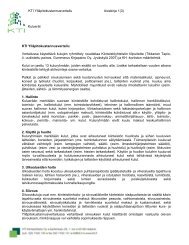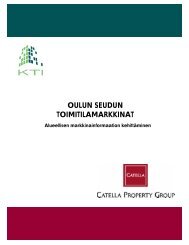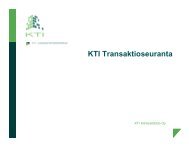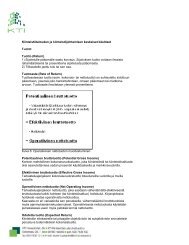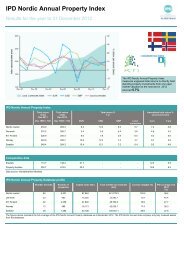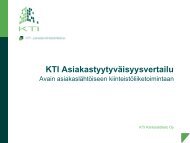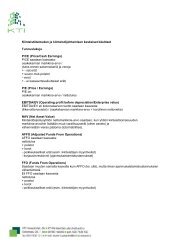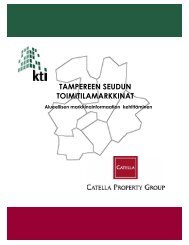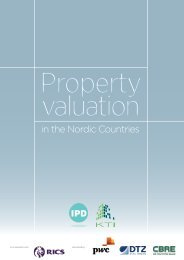The Finnish Property Market 2012 - KTI
The Finnish Property Market 2012 - KTI
The Finnish Property Market 2012 - KTI
Create successful ePaper yourself
Turn your PDF publications into a flip-book with our unique Google optimized e-Paper software.
Rental practices<br />
Rental practices vary in the <strong>Finnish</strong> commercial property<br />
market. <strong>The</strong> liberal legislation regulating leases gives parties<br />
freedom to agree on terms and conditions.<br />
“<strong>Finnish</strong> legislation<br />
conserning rental<br />
agreements is very<br />
liberal”<br />
A common term in <strong>Finnish</strong> lease agreements is “until further<br />
notice”: an indefinite contract is valid until either the tenant<br />
or landlord wishes to terminate it after an agreed notice<br />
period, which is typically three, six or 12 months. <strong>The</strong>se<br />
indefinite lease terms are especially popular in multi-tenant<br />
buildings and smaller office units, but are also widely used in<br />
other property types. <strong>The</strong> landlord must, however, have an<br />
acceptable cause to terminate the contract: rent adjustment,<br />
16<br />
<strong>The</strong> <strong>Finnish</strong> <strong>Property</strong> <strong>Market</strong> <strong>2012</strong><br />
Photo: NCC / Sini Pennanen<br />
2005–2007, the use of auction processes in large transactions<br />
became common. In current market conditions, no auction<br />
processes are carried out, as the number of participants<br />
has decreased. However, in the quiet markets, the advisor’s<br />
role increases again, as he or she serves to interconnect the<br />
parties and their objectives.<br />
“Transaction processes<br />
last long in current<br />
market conditions”<br />
Other phenomenon brought about by the slowdown is<br />
the lengthening of the transaction processes. Currently,<br />
the processes are also lengthened due to the lenders’<br />
involvement in negotiations, especially in cases when assets<br />
with complicated financial structures are sold due to nonperforming<br />
loans. <strong>The</strong> slowdown has also resulted in a<br />
significant decrease in the average size of transactions.<br />
tenant mix changes, or rearrangement of the property<br />
portfolio are among the conditions used to justify lease<br />
termination.<br />
<strong>The</strong> indefinite leases often last long, as both parties<br />
typically tolerate temporary fluctuations in the market. This<br />
means that at the peak of the market tenants might pay less<br />
than the current rental value, whereas in the downturn they<br />
pay more. Both parties normally accept this, and do not<br />
exercise the break clause easily. For its part, the landlord<br />
wants to avoid periodic vacancy and the cost of searching<br />
for a new tenant. In turn, tenants are not willing to pay the<br />
cost of searching for new premises and the costs of moving.<br />
This kind of flexibility is based on the assumption that in the<br />
longer term, the contract rent is adjusted to correspond to<br />
the long term rental value.<br />
Where fixed terms are used, the contract periods are<br />
typically quite short compared with international practices.<br />
In multi-tenant office buildings, a typical fixed term is from<br />
three to five years. In the commercial property market, it is also<br />
common to agree on a fixed-term lease, which then continues<br />
automatically for an indefinite period – with an agreed notice<br />
period – until one party wishes to terminate it.<br />
For larger units, longer fixed-term agreements are<br />
commonly applied. For a purpose-built, single-tenant<br />
office building, a net lease of ten years or more is common.<br />
Agreements in large single-tenant buildings in, for example,<br />
sale-and-leaseback arrangements, often have lease terms<br />
of up to 20 years. <strong>The</strong> popularity and terms of this kind of<br />
agreements are driven by both financial market conditions as<br />
well as accounting issues. <strong>The</strong> planned new IFRS17 standard<br />
might affect large companies’ interest in long leases, as all




